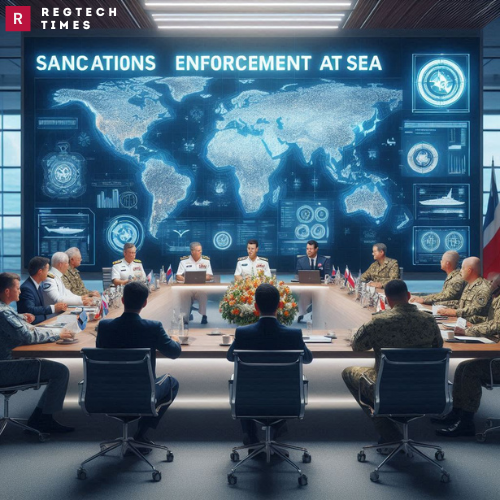On August 21, 2024, Tokyo played host to a significant roundtable discussion on “Sanctions Enforcement at Sea,” reflecting the growing international cooperation in maritime security. This high-level event coincided with the port call of two German Navy ships—the Frigate “Baden-Württemberg” and the Supply Ship “Frankfurt-am-Main”—marking a pivotal moment in the ongoing security dialogue between the European Union (EU) and Japan.
The roundtable, organized by the EU Delegation to Japan and the German Embassy in Japan, was supported by the EU project Enhancing Security Cooperation In and With Asia (ESIWA). It drew together diplomats, military personnel, and experts from across the EU and Japan to discuss the multifaceted aspects of enforcing international sanctions at sea. This gathering not only highlighted the importance of maritime security but also showcased the commitment of both regions to uphold global sanctions regimes.
Maritime Security Focus: Key Objectives and Discussions
The primary aim of the roundtable was to foster a peer-to-peer exchange on the political, legal, and operational dimensions of sanctions enforcement at sea. Participants engaged in detailed discussions about the mechanisms and challenges involved in ensuring compliance with international sanctions, particularly those imposed by the United Nations Security Council (UNSC).
The event featured prominent speakers from various organizations, including Japan’s Ministry of Foreign Affairs and Ministry of Defense, the European External Action Service, the EU Naval Force Mediterranean Operation Irini, and representatives from the German and French navies. The discussion also included contributions from the Pacific Security Maritime Exchange (PSMX), an initiative focused on enforcing sanctions against North Korea.
Maritime Sanctions Enforcement in Focus
The roundtable emphasized the crucial role of maritime enforcement in the global sanctions framework. Both the EU and Japan are deeply invested in the effective implementation of sanctions, especially in regions where maritime routes are pivotal to the enforcement process. The EU’s naval operation, EU NAVFOR MED Irini, serves as a case in point, with its mandate to enforce the UN arms embargo on Libya in the Mediterranean Sea. This operation reflects the EU’s broader commitment to maritime security and sanctions enforcement.
Similarly, Japan’s active participation in the PSMX and the Enforcement Coordination Cell (ECC) based in Yokosuka illustrates its significant role in the Pacific region. These initiatives are critical for managing the maritime aspects of sanctions against North Korea, aimed at curbing illicit activities and ensuring compliance with UNSC resolutions.
Collaboration and Coordination
The discussions in Tokyo highlighted the necessity of international collaboration in sanctions enforcement. The convergence of expertise from various nations and organizations facilitates a more robust and coordinated approach to maritime security. The roundtable provided a platform for sharing best practices, addressing operational challenges, and exploring innovative solutions to enhance the effectiveness of sanctions enforcement.
Moreover, the event emphasized the importance of integrating military, diplomatic, and research perspectives to achieve comprehensive enforcement strategies. By bringing together diverse stakeholders, the roundtable aimed to strengthen the collective capacity to address the complex dynamics of maritime sanctions.
The ESIWA Project
Central to the discussions was the role of the ESIWA project, which aims to enhance the EU’s security and defense cooperation with the Indo-Pacific region. The project focuses on several thematic areas, including maritime security, crisis management, and cyber security. Co-funded by the EU, the German Federal Foreign Office, and the French Ministry for Europe and Foreign Affairs, ESIWA is implemented by the German Corporation for International Cooperation (GIZ) and Expertise France.
Tensions Rise as Chinese Prosecutors Indict Japanese Citizen on Espionage Charges
The ESIWA project supports the EU’s agenda in the Indo-Pacific as a strategic security enabler. Its activities are designed to bolster maritime security cooperation, facilitate dialogue on sanctions enforcement, and promote shared understanding of security challenges in the region.
The roundtable on sanctions enforcement at sea marks a significant step in the ongoing efforts to strengthen international maritime security. By fostering collaboration between the EU and Japan, the event highlighted the importance of a united approach to enforcing global sanctions and maintaining the integrity of international maritime regulations.
As the global security landscape continues to evolve, the commitment of the EU and Japan to enhancing maritime security and sanctions enforcement will remain crucial. The insights gained from this roundtable will undoubtedly contribute to more effective and coordinated efforts in the future, ensuring that international sanctions are upheld and that maritime routes remain secure.


